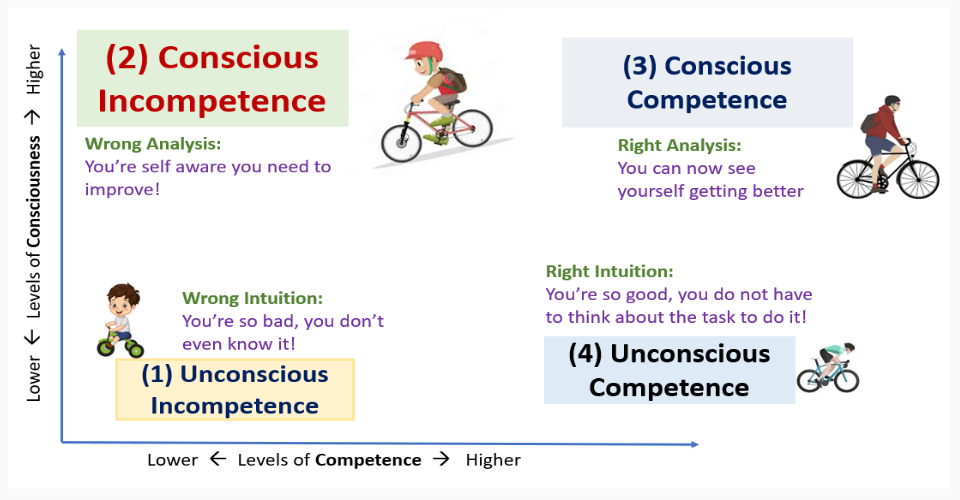The Four Levels of Competency

Learning takes time, BUT with the right plan, we can progress faster. It helps to be aware of the Four Stages of Competence in Learning a Skill. It's a model that outlines how we progress from not knowing what we don't know to becoming so skilled at something that we don't even have to think about it. Sounds intriguing, right? Let's break it down.
First up is "Unconscious Incompetence." This is where we all start with any new skill or knowledge area. Imagine picking up a guitar for the first time. At this stage, you don't even realize how much you don't know. You might think you can just strum a few strings and produce a melody, but you're blissfully unaware of the nuances involved. It's a bit of an ego boost at first because ignorance is bliss, but it's also the most crucial stage for growth.
Then we move into "Conscious Incompetence." This stage is where reality hits. You start to realize how much you need to learn and how inadequate your current skills are. Using the guitar analogy, it's when you notice that your fingers hurt, your chords sound off, and your rhythm is non-existent. It's a tough phase because it can be quite demotivating. However, it's also the stage where learning truly begins because you're now aware of your limitations.
Next is "Conscious Competence." This is where things start to get exciting. You've put in the hours of practice, and now you're beginning to see some progress. You can play a few songs, but you still have to think about every movement and every chord change. It's deliberate and sometimes exhausting, but it's also incredibly rewarding. You're aware of your abilities and the effort it takes to execute them.
Finally, we arrive at "Unconscious Competence." This is the sweet spot. Your skills are so ingrained that you don't have to think about them anymore. It's like driving a car—you just do it. For our guitar player, it's the stage where you can pick up the instrument and play effortlessly, losing yourself in the music. Your fingers know where to go without you having to guide them consciously.
What's amazing about this model is that it applies to nearly everything we learn in life, not just tangible skills like playing an instrument. Think about public speaking, for instance. Initially, you might not realize how challenging it can be (unconscious incompetence). Then, after a few awkward speeches, you become painfully aware of your shortcomings (conscious incompetence). With practice, you improve but still have to think about your delivery (conscious competence). Finally, one day, you're speaking fluidly without a second thought (unconscious competence).
One thing to remember is that moving through these stages isn't always a linear process. Sometimes, you might feel like you've reached unconscious competence, only to encounter a new challenge that sends you back to conscious competence. It's all part of the learning journey, and it's perfectly normal.
Also, the time it takes to progress through these stages varies from person to person and skill to skill. Patience and persistence are key. Some skills might take years to master, while others might only take a few months. The important thing is to keep pushing forward, even when it feels tough.
Another interesting aspect is that we often experience multiple stages simultaneously in different areas of our lives. You might be unconsciously competent at cooking but still consciously incompetent at a new job. Recognizing where you are in each area can help you tailor your learning strategies and set realistic expectations.
So, the next time you embark on learning something new, remember these stages. Embrace the discomfort of conscious incompetence, and celebrate the small victories of conscious competence. Before you know it, you'll be effortlessly performing tasks that once seemed impossible.
